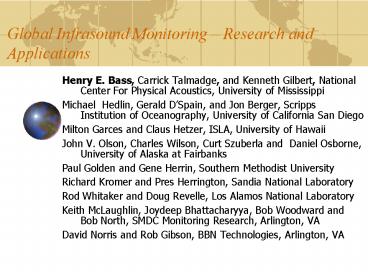Global Infrasound Monitoring
1 / 24
Title:
Global Infrasound Monitoring
Description:
Global Infrasound Monitoring Research and Applications Henry E. Bass, Carrick Talmadge, and Kenneth Gilbert, National Center For Physical Acoustics, University of ... –
Number of Views:75
Avg rating:3.0/5.0
Title: Global Infrasound Monitoring
1
Global Infrasound Monitoring Research and
Applications
- Henry E. Bass, Carrick Talmadge, and Kenneth
Gilbert, National Center For Physical Acoustics,
University of Mississippi - Michael Hedlin, Gerald DSpain, and Jon Berger,
Scripps Institution of Oceanography, University
of California San Diego - Milton Garces and Claus Hetzer, ISLA, University
of Hawaii - John V. Olson, Charles Wilson, Curt Szuberla and
Daniel Osborne, University of Alaska at Fairbanks - Paul Golden and Gene Herrin, Southern Methodist
University - Richard Kromer and Pres Herrington, Sandia
National Laboratory - Rod Whitaker and Doug Revelle, Los Alamos
National Laboratory - Keith McLaughlin, Joydeep Bhattacharyya, Bob
Woodward and Bob North, SMDC Monitoring Research,
Arlington, VA - David Norris and Rob Gibson, BBN Technologies,
Arlington, VA
2
Research Issues
- Use of Infrasound Data to Further other Research
- Hazard Warning
- Meteorology
- Sprite Physics
- Bolide Distributions
- Research Needed to Optimize Infrasound Station
Performance - Wind Noise Reduction
- Signal Processing Techniques and Processes
- Research Needed to Optimize Use of Data
- Source Characterization
- Meteorological Effects
3
GE Earthquakes, Tsunamis, Avalanches
- Civil Disaster Management
LePichon, 2001 Arequipa Earthquake June 23, 2001
Mb 4.3 at IS59
4
GE Volcanoes
- Eruption and ash monitoring
- Eruption forecasting
- Atmospheric tomography
IS59 Kilauea, Mauna Loa, and Hualalai, Hawaii
Hekla, Iceland (Lizska, 2001)
IS55 Erebus, Antarctica
LePichon, 2001 Etna, Italy
5
GE Severe Weather
- Microbaroms may allow storm tracking with
infrasound
Microbaroms and surf (800x)
6
Meteorological Effects
- Speed of Sound Varies With Altitude, Location and
Time - Current Meteorological Models and Limitations
- Propagation Models/Verification
- Tomography
7
The Speed of Sound is Determined by Wind Speed
and Temperature
8
GE Electromagnetic Activity
- Sprites, Aurora
source at 90 km height
Liszka, 2001 Sprites in Sweden May 26/27, 1995
9
GE Bolides
- Bolide impact distribution will be modified by
new infrasonic recordings get stats!
2001 Leonid recorded at IS59
April 23, 2001 10kt
10
GE Turbulence and Atmospheric Waves
- Clear air turbulence monitoring
- Lower, middle and upper atmosphere dynamics
11
GE Littoral Processes
Kualanui 100X
12
Microbarams
- Progress towards predicting amplitude and
frequency dependence not just existence.
13
- Coastal surf activity
14
Geophysical Events IS10
Brown, 2000, in McCormack, 2001
N
IS10 Winnipeg, Canada December 16, 1999 to
September 1, 2000 Approximately 4200
detections
microbaroms, Hudson Bay ?
Local blasting, Too small to register on local
seismic
?
E
W
Local blasting Thunder Bay area, too small to
register on local seismic
mining activity, Minnesota, registers strongly on
local seismic
microbaroms, Pacific Ocean (?)
S
15
Geophysical Events
- Ground Truth Event Database is growing CMR and
IDC - Some sources are poorly characterized
Subset of CMR GT Database
16
Source Characterization
- Explosions
- Weather
- Lightning
- Volcanoes
- Bolides
- Earthquakes, Tsunamis, etc.
17
Research Needed to Optimize Infrasound Station
Performance
- Wind Noise
- Infrasonic Wave Propagation
- Sensors and calibrators
18
Wind Noise
19
Wind-noise-reducing filters
- 120-port design
- Valves at each port and at main manifold
- PVC construction
- Custom manifolds, off-the-shelf fittings
- Fenced area
20
Alternatives to Spatial Filtering
- OFIS Still filters spatially but sums at the
speed of light. - Microphone Arrays Still filters spatially but
sums at the speed of light. - Active wind noise correction.
21
SI Infrasonic Wave Propagation
- Some progress in integration of required
environmental information for modeling further
work required to resolve outstanding issues such
as - observed errors in azimuth
- phase identification
- scattering and diffraction
- Final goal of an operational full modeling
capability (waveforms, travel times, phase
velocities, amplitudes) - Continue to collect ground truth data and
associated environmental information
22
SI Sensors and calibrators
- A number of new sensor technologies are under
development - Global network should continue to take advantage
of innovations in infrasound technology - Need for field calibrators and calibration
standards - Development of new sensor types should consider
calibration requirements
23
Concluding Remarks
- Keep in mind that we do not understand most
signals received what are we missing? - We might be keen on improving our stations but
the true value is in the information provided
about physics of interest not the station per
se. - Hazard Warning is a Hot Topic but Hot Topics
change good physics remains good physics.
24
The End








![Earthquake Prediction Research [EPR]](https://s3.amazonaws.com/images.powershow.com/P1252428560pfrIQ.th0.jpg?_=20140201108)






















